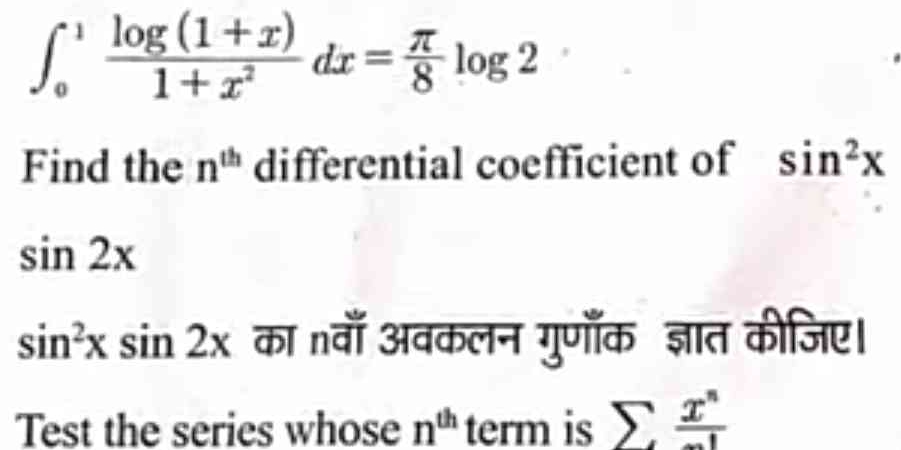Evaluate the integral ∫₀¹ log(1+x)/(1+x²) dx = π/8 log 2. Find the nth differential coefficient of sin²x. Test the series whose nth term is Σ(xⁿ/n!).

Understand the Problem
The question involves multiple mathematical problems such as evaluating an integral, finding a differential coefficient, and testing a series. The high-level approach includes solving the integral and using differentiation techniques to find the nth differential coefficient, and applying series tests.
Answer
1. Integral: $ \int_0^1 \frac{\log(1+x)}{1+x^2} \, dx = \frac{\pi}{8} \log 2 $ 2. nth differential coefficient of \( \sin^2 x \): Recursive calculation yields results such as \( n^{th} \text{ derivative} \). 3. Series: $ \sum_{n=0}^{\infty} \frac{x^n}{n!} \text{ converges for all } x. $
Answer for screen readers
-
Integral: $ \int_0^1 \frac{\log(1+x)}{1+x^2} , dx = \frac{\pi}{8} \log 2 $
-
n-th differential coefficient of ( \sin^2 x ): It can be found recursively. For example, the first derivative is ( \sin(2x) ), the second derivative becomes ( 2\cos(2x) ), and it continues based on standard differentiation rules.
-
Series Convergence: The series ( \sum_{n=0}^{\infty} \frac{x^n}{n!} ) converges for all ( x ).
Steps to Solve
-
Evaluate the Integral To prove that $$ \int_0^1 \frac{\log(1+x)}{1+x^2} , dx = \frac{\pi}{8} \log 2 $$ we can utilize integration techniques such as integration by parts or substitution.
-
Find the nth Differential Coefficient of ( \sin^2 x ) The first step to find the nth differential coefficient, ( \frac{d^n}{dx^n}(\sin^2 x) ), involves using the chain and product rules of differentiation.
-
Apply Formula for Sin Functions Using the identity for differentiation, $$ \frac{d}{dx}(\sin^2 x) = 2\sin x \cos x = \sin(2x) $$ For ( n \geq 1 ), the differentiation pattern continues, giving us multiple derivatives.
-
Test the Series To test the series given by the nth term $$ \sum_{n=0}^{\infty} \frac{x^n}{n!} $$ this is recognized as the Maclaurin series expansion for ( e^x ).
-
Check Convergence of the Series The series converges for all real numbers ( x ), which can be determined using the ratio test or the root test.
-
Integral: $ \int_0^1 \frac{\log(1+x)}{1+x^2} , dx = \frac{\pi}{8} \log 2 $
-
n-th differential coefficient of ( \sin^2 x ): It can be found recursively. For example, the first derivative is ( \sin(2x) ), the second derivative becomes ( 2\cos(2x) ), and it continues based on standard differentiation rules.
-
Series Convergence: The series ( \sum_{n=0}^{\infty} \frac{x^n}{n!} ) converges for all ( x ).
More Information
The integral presents a nice relationship between logarithmic functions and rational functions. The derivatives of ( \sin^2 x ) often involve multiple angles, showcasing periodicity in trigonometric functions. The series ( e^x ) connects deeply with calculus, essential for understanding limits and continuity.
Tips
- Forgetting the chain rule when differentiating ( \sin^2 x ).
- Misapplying convergence tests for series; it's crucial to recognize forms of known series.
- Not clearly showing work in integration; steps should be elaborated clearly.
AI-generated content may contain errors. Please verify critical information